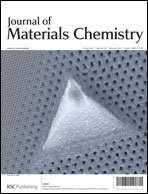Large scale incorporation of nanomaterials into industrial systems and commercial products is relatively new, and therefore little attention has been given for options when these products reach their end-of-life. During the course of this study, the ability to recycle end-of-life (EOL) single-wall carbon nanotubes (SWCNTs), recovered from lithium ion battery electrodes, was investigated. Specifically, SWCNT–Li+ coin cells were forced to their EOL though extended cycling at high charge rates and recycled using a series of acid and thermal treatments originally developed for the purification of as-produced SWCNT material. The recycling treatments were successful in removing the EOL byproducts (e.g. solid electrolyte interphase, lithium) and upgrading the SWCNT material to its pre-cycling functionality. The material was characterized at each step in the recycling process through a combination of scanning electron microscopy, thermogravimetric analysis, Raman spectroscopy, and optical absorption spectroscopy. The energy required for each of the recycling procedures was measured and compared to the energy of SWCNT synthesis. The recycled-SWCNT material was successfully incorporated into Li+ battery coin cells with insertion and extraction capacities of 650 mA h g−1, comparable to the virgin pure-SWCNT electrodes. Therefore, the ability to refunctionalize “used” SWCNTs from a device, through chemical processing, to their initial purity and functionality has been demonstrated. The direct energy required to refunctionalize the SWCNTs was measured and is less than half of the direct energy required to synthesize new material. Thus, the ability to preserve the nanoscale properties of SWCNTs with reduced impact offers new opportunities for end-of-life management.

You have access to this article
 Please wait while we load your content...
Something went wrong. Try again?
Please wait while we load your content...
Something went wrong. Try again?


 Please wait while we load your content...
Please wait while we load your content...